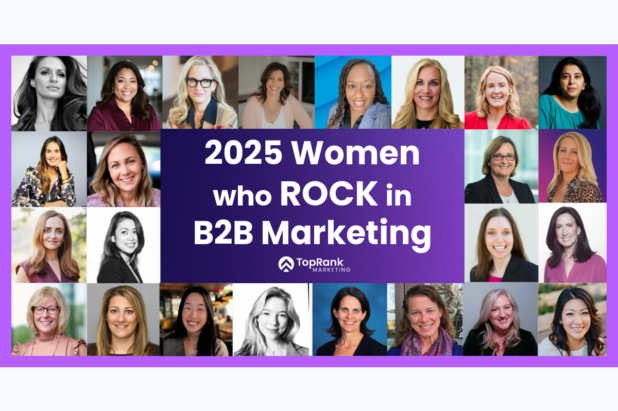
I’m going to be visiting the windy city for SES Chicago this week and have been trying to figure out where to explore if I can find some time while I’m there. I always enjoy a great meal so turning to search engines and social media platforms was an obvious answer for me to find great restaurants.
Understanding how end consumers use search and social to find and discuss your business online is key in creating an effective online marketing strategy. The more that you study and adapt your strategy to positively impact new customers, the more successful your social media strategy will be.
What Would You Search For?
When assembling an optimized social media strategy it is important to get in the mindset of your audience. That means thinking about search as well as social since the discovery experience often involves both. Put yourself in the mind of your customer: What search phrases would you use to find what you were looking for?
The easy choice for researching keywords is the free Google AdWords Keyword Tool. If you’re a restaurant owner in Chicago that expects online customers to find the restaurant and book reservations, it’s essential to know the most relevant and popular keywords searched on a monthly basis.
Below is an example of a keyword search that I completed as it relates to finding a great restaurant in Chicago. Many social media strategists don’t consider researching keyword phrases, but it is imperative that you are aware of the different variations of keywords that can be used to locate your business. Customers might start the process of finding a restaurant with search first, before going to their friends and asking for recommendations.
Google’s AdWords Keyword Tool will show keyword competitiveness, monthly searches per month and additional keyword ideas. Now you can use those phrases as inspiration when creating social content that is a little more search friendly (optimized) socially. Other keyword research tools include: WordTracker, Wordstream and Ubersuggest.
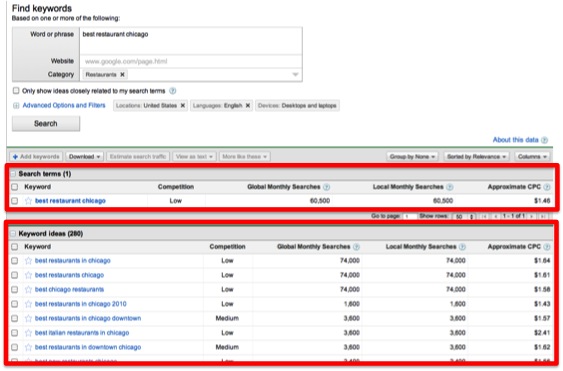
Takeaway #1: Know Your Audience.
By getting into the search mindset of your audience you are more equipped to develop a need based social media marketing strategy. Customers looking for services and things like restaurants often go to their social networks and ask for recommendations and then to a search engine like Google to get more information. Other customers will start the process at Google and then ask their friends for opinions about what they found in the search results. Either way, it’s important to use the tools available to you in order to understand how customers are using search and social so your marketing can be present at the moment of need.
Provide Value To Your Followers (and prospective followers)
Twitter provides a great deal of information when it comes to seeing what users (and businesses) have to say about a phrase like the “best restaurants in Chicago.” What I typically find is a good mixture of user generated content as well as businesses that have incorporated my search term into their social keyword strategy. In fact, one of the top 5 tweets related to my search term was published by a restaurant.
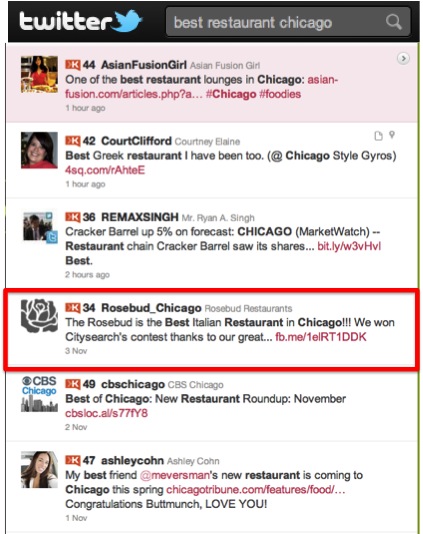
Rosebud Restaurants (@RoseBud_Chicago) is a search result created by a business as part of a social strategy. Marketers within any industry can take note of the way that RoseBud Chicago has optimized for keywords and worked to provide useful information to their followers. The content is clever, engaging, and links to their Facebook page which displays mouth watering photos of select menu items.
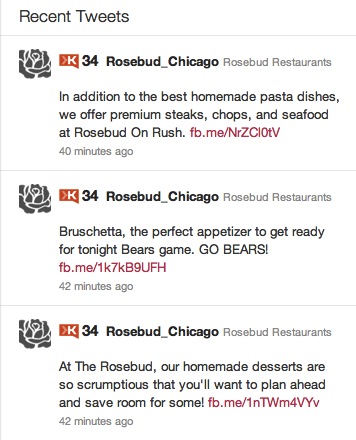
Takeaway #2: Provide Value.
Worthwhile content can go a long way. Although you may not have photos of your products or services on display there are still things of great value that you can provide. Perhaps a series of white papers or news articles that are relevant to your audience will entice them to research you further and take next steps. If you don’t provide valuable information to your potential customers someone else will.
Don’t Sit and Wait: Be Sure to Engage Your Followers
Interaction is key when executing a social media strategy. I think that sometimes we lose sight of the fact that social media should be a combination of sales and marketing. Simply pushing out information will not get results. The more that you can engage your audience and encourage them to share and act, the more willing they will be to come back for more and tell their network to do the same. Another Chicago establishment that I think is doing a good job of this is Protein Bar Chicago (@proteinbarchi). Not only is Protein Bar Chicago responding to tweets but they are also asking engaging questions to inspire next steps.

Takeaway #3: Engagement is good for business.
Simple acknowledgment of fans and followers helps build the relationship between a customer and a service provider. Asking engaging questions and providing timely response to questions can have a very large impact on brand loyalty and business.
User Generated Content Can Have a Large Impact
Think outside of the box when it comes to online sharing. While it is true that some users (like myself) will turn directly to their social networks, others may not. If someone goes to Google and searches for the “best Chicago restaurants” are the results on the first page likely to be typical social media profiles? Chances are that they wont. By utilizing sites that allow for user generated content this opens up a whole new world of possibilities. For review websites such as Yelp, Zagat, and UrbanSpoon, users provide detailed information about the restaurant atmosphere, price, menu, service, etc. Remember, happy customers can equal brand advocates.
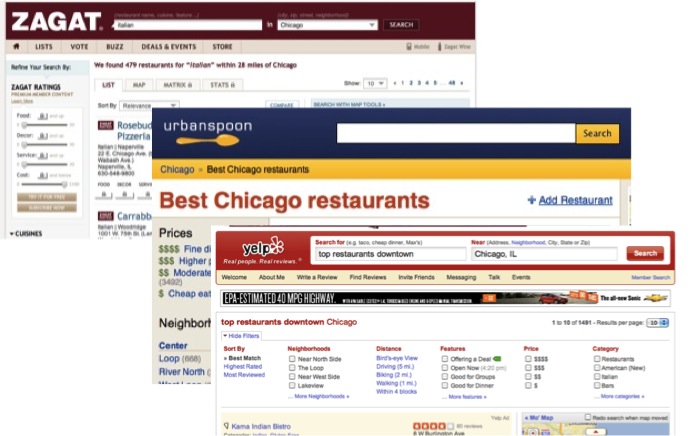
Takaway #4: Keep customers happy and encourage them to share.
Do you know what sites your target audience uses to voice their opinions about products or services such as yours? By identifying these platforms in addition to standard social media sites that you should have an active presence on you are poised to cover bases that your competition may not have considered.
What Now?
I know that in this post I have provided a very small example of how one industry can connect and engage customers through search and social media, but I challenge you to apply it to your own company and to think about the following questions and how they relate to your target audience:
- What is your audience searching for?
- What are the problems that your product/service solves?
- What makes your product/service different from competitors?
- What can you do to differentiate your business and engage prospects and customers online?

